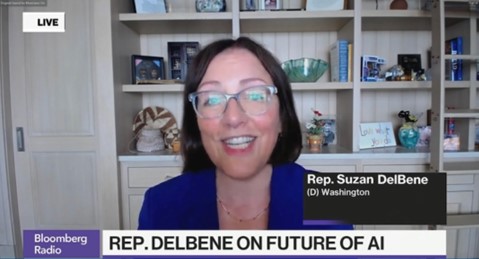Press Releases
DelBene on Regulating AI: Privacy is the ‘Fundamental Building Block’
KIRKLAND, WA ,
September 7, 2023
Today, Congresswoman Suzan DelBene (WA-01) joined Bloomberg’s Sound On to discuss AI and how data privacy must underpin our approach to all tech policies including AI policy. DelBene recently published an op-ed in Newsweek highlighting the importance of passing a national data privacy law that protects Americans' sensitive information, improves the quality of AI products, and gives the U.S. a seat at the international table. The video can be found here and the transcript is below. Mathieu: We're having an important conversation about AI, and it's one that you have waded into in an op-ed in Newsweek that I'd like to ask you about. We've heard Senator Chuck Schumer say that he's working on a bipartisan approach here to get some regulatory legislation in the works. It's kind of hard to imagine that happening in the climate that we're in. But in your op-ed, you're talking about privacy here, and you say the first step is a national privacy law. Is there an appetite for it on Capitol Hill? DelBene: Well, there has been, and I really think that as we look at technology policy broadly, we have to start with the fundamentals, and the most fundamental piece is privacy. Privacy means you being able to protect your most sensitive personal information, not allowing people to take information about you, in many cases that you aren't even aware of, and use that information in ways that you don't expect or sell that information. It's very important that we have federal consumer data privacy legislation, and we have some states who put some pieces of legislation in place, some policies in place, but we need one consistent federal law so that your data is protected everywhere, and it's also incredibly important because that's policy that we need to bring to the international table as we talk about what international policy looks like. When we don't have domestic policy, we really struggle to set direction where we think international policy should go. So, data is a place to start, because what feeds AI? Lots and lots of data, and we should make sure that we're protecting data as the first place to start. Mathieu: Well, we know it's creeping into the political space, and I'm sure you saw the headlines today about Google. This feels like a moment to me as well. We've seen AI and, you know, Deepfakes creep into some political ads, not to mention the way campaigns might be able to use that as an organizing tool. But look at this now, political ads using AI on Google and YouTube must soon be accompanied by, essentially a watermark, a prominent disclosure if imagery or sounds have been synthetically altered. Are we getting our arms around this Congresswoman, or is it moving too fast for us to do so? DelBene: Well, first I'd say from a policy standpoint, we're behind, because, as I talk about privacy legislation, we should already have privacy legislation—federal privacy legislation—in place. That's why I have such a great sense of urgency about that. But you're going to continue, as we continue, to battle misinformation, disinformation that folks are seeing, and what the impact AI can have, you're going to continue to see organizations try to figure out what they think an environment should look like, how they should make sure that misinformation, disinformation, or at least what type of labeling should be out there to highlight anything that might have been manipulated, so folks are aware. But I actually think there's an important role for the government to play in putting policies in place to really describe what the rules of the road are, going forward, and we haven't done a good job of that. Folks—it's a complicated issue—but folks have been hesitant to put policy in place. And that's why I go back to privacy because that's the fundamental building block. We've had legislation, we've debated and looked at and we need to move here so that we can continue then to build on all these other issues that are going to continue to either—to continue to become problematic or issues we don't even know about yet that are going to come up and we're going to need to tackle. So, we need to make this a priority, we need to move quickly. Mathieu: Well, we sure do. I don't know how many of your colleagues know as much about this as you do. But they need to start catching up quick. Because this is a very important story for us here at Bloomberg, and it's one that we'd like to stay in touch with you on, Congresswoman.
|

